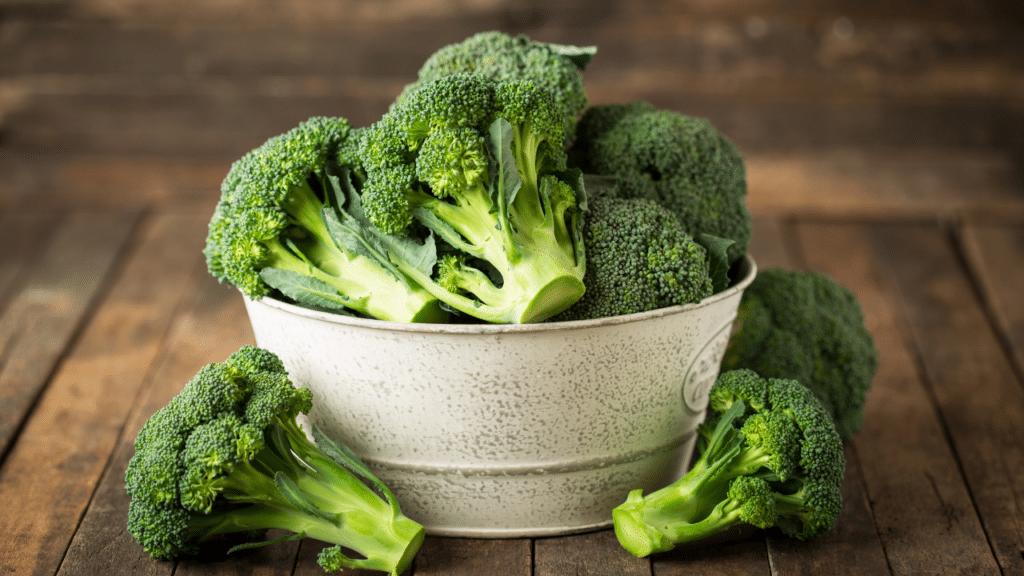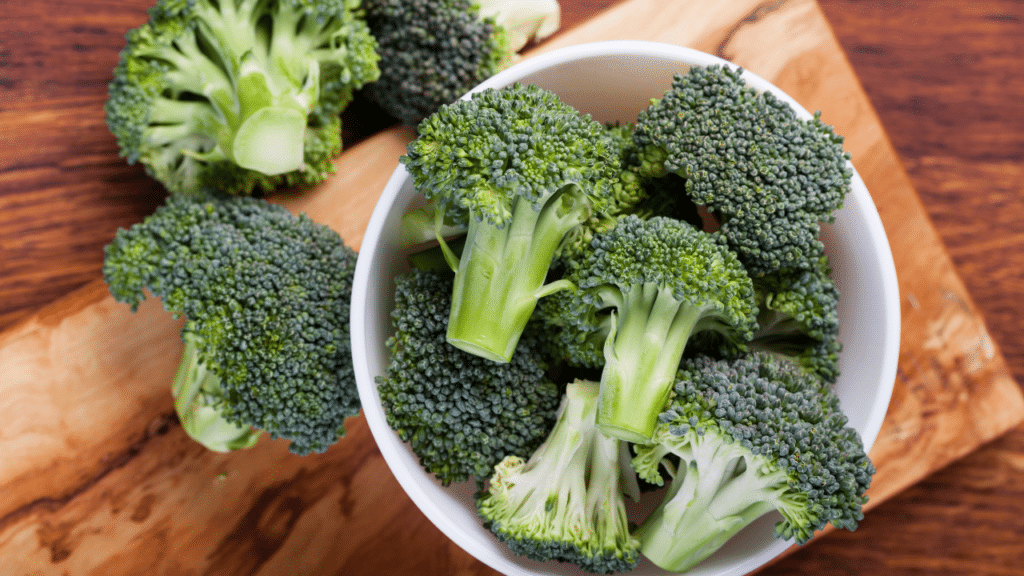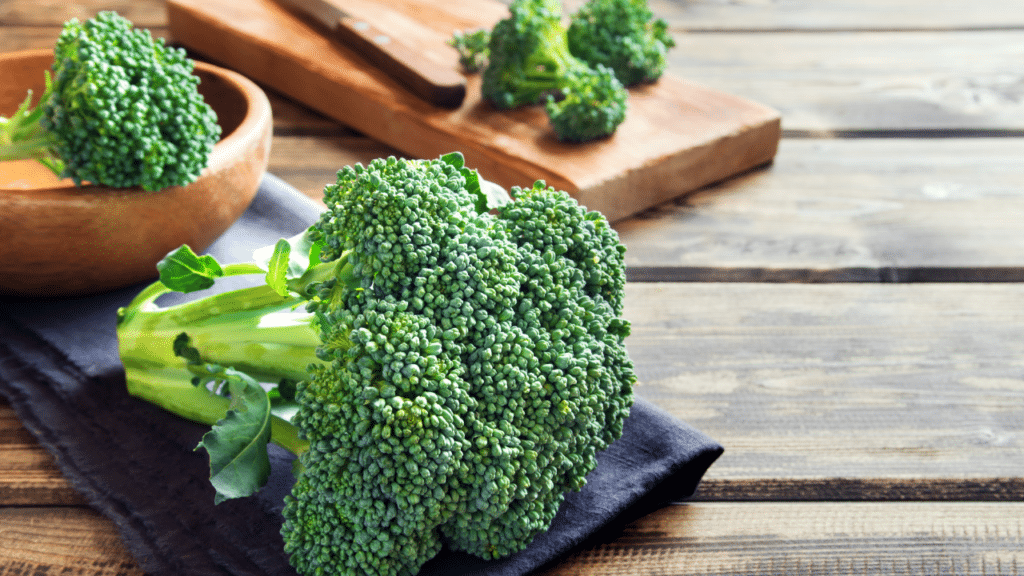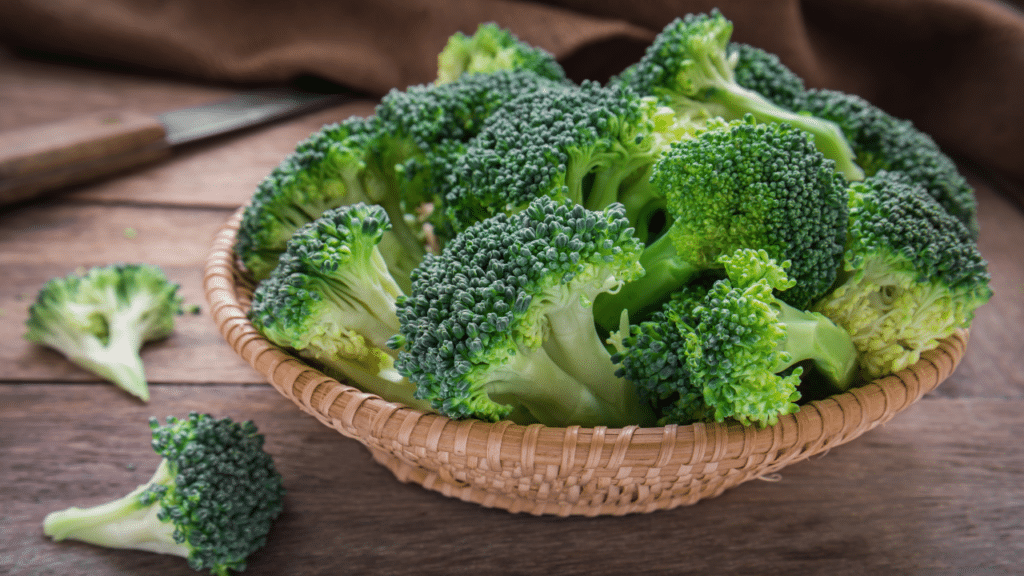Broccoli, a nutritious and widely enjoyed vegetable, occasionally presents an unwelcome gritty texture that detracts from its appeal. This issue primarily arises when residual dirt and tiny sand particles cling to the nooks and crannies of the broccoli head. Even a seemingly clean broccoli head harbors these gritty intruders deep within the florets.
Broccoli tastes gritty often due to sand and dirt trapped in its florets. Proper washing before cooking usually prevents this issue.

Also Read: Why are my green beans fuzzy? Unraveling the Mystery
Contents
- 1 Why Does My Broccoli Taste Gritty?
- 2 1. Residual Soil or Dirt
- 3 2. Pesticide Residue
- 4 3. Cooking Water
- 5 4. Old or Poor Quality Broccoli
- 6 5. Improper Cooking Technique
- 7 6. Cross-contamination
- 8 How do you get grit out of broccoli?
- 9 Why does my broccoli taste weird?
- 10 Is it OK to eat crunchy broccoli?
- 11 What happens if I eat unwashed broccoli?
- 12 FAQ
- 13 Conclusion
Why Does My Broccoli Taste Gritty?
If you taste broccoli, I’ve found some possible causes for this unpleasant sensation. Given below these reasons and others:
1. Residual Soil or Dirt
Broccoli is a vegetable that grows in the ground, and sometimes residual soil or dirt may be trapped between the florets or in the crevices. Washing the broccoli thoroughly under running water can help remove any grit.
2. Pesticide Residue
If broccoli has been treated with pesticides or other chemicals during its growth, residue might be left on the surface. Washing or soaking broccoli in a vinegar solution (one part vinegar to three parts water) can help remove some pesticide residues.
3. Cooking Water
If you blanch or cook broccoli in water, the water might contain some dissolved minerals or particles, making the broccoli taste gritty. Make sure to rinse the broccoli thoroughly after cooking.
4. Old or Poor Quality Broccoli
Broccoli that has been stored for too long or is of poor quality may develop a gritty texture. Fresh broccoli is generally firmer and has a better texture. Purchase fresh broccoli and consume it within a few days of purchase.
5. Improper Cooking Technique
Overcooking broccoli can also affect its texture, making it mushy or gritty. Steam or blanch broccoli until it is just tender to avoid overcooking.
6. Cross-contamination
There might be cross-contamination if you use the same cutting board or knife used for cutting soil-covered vegetables or other gritty substances.

Also Read: Why am I Craving Guacamole? A Deep Dive into Reasons
How do you get grit out of broccoli?
You can follow these steps to remove grit from broccoli:
- Rinse Under Running Water:
- Rinse the broccoli under cold running water. Use your hands to gently rub the broccoli’s surface, ensuring that water reaches all parts of the vegetable.
- Soak in Vinegar Solution:
- Fill a bowl with a solution of one part white vinegar to three parts water. Submerge the broccoli in this solution for a few minutes. The acidity of the vinegar can help break down any residues and remove grit. After soaking, rinse the broccoli thoroughly under running water.
- Use a Vegetable Brush:
- If you have a vegetable brush, use it to scrub the surface of the broccoli, paying attention to the areas between the florets and any crevices where grit might be trapped.
- Cut and Inspect:
- Cut the broccoli into smaller florets or pieces. This allows you to inspect each piece more closely and ensures water can reach all surfaces during rinsing.
- Blanching Method:
- If you’re cooking the broccoli, blanching can also help remove grit. Submerge the broccoli in boiling water for a brief period (about 2-3 minutes) and then immediately transfer it to an ice bath to stop the cooking process. Rinse the broccoli under cold water to remove any remaining grit.
- Inspect Again:
- After rinsing or blanching, inspect the broccoli again to ensure all grit has been removed.
Why does my broccoli taste weird?
There are several reasons why your broccoli might taste weird. Here are some common factors that can affect the taste of broccoli:
- Overcooking:
- Overcooking broccoli can lead to a mushy texture and an unpleasant flavor. It’s best to cook broccoli until it is tender but retains some crispness.
- Undercooking:
- On the other hand, undercooking broccoli may result in a raw or bitter taste. Ensure that you cook it adequately to eliminate any harsh flavors.
- Spoilage:
- If broccoli is past its prime or has spoiled, it can develop an off or weird taste. Check for any signs of spoilage, such as a strong, unpleasant odor or slimy texture, and discard any spoiled broccoli.
- Varietal Differences:
- Different varieties of broccoli can have slightly different flavors. If you’re used to one type and try another, it may taste unfamiliar or weird.
- Storage Issues:
- Improper storage can impact the flavor of broccoli. Store broccoli in the refrigerator and use it within a few days of purchase to ensure freshness.
- Cross-contamination:
- If the broccoli comes into contact with other strong-smelling or flavored foods in the refrigerator, it can absorb those odors and tastes, leading to a weird flavor.
- Pesticide Residues:
- If the broccoli has been treated with pesticides or other chemicals, it may have a residual taste. Washing the broccoli thoroughly can help reduce pesticide residues.
- Quality of the Broccoli:
- The overall quality of the broccoli can affect its taste. Fresh, high-quality broccoli tends to have a better flavor than broccoli which has been stored for an extended period.

Also Read: Orange vs Tangerine: The Ultimate Citrus Showdown
Is it OK to eat crunchy broccoli?
Yes, it is absolutely okay to eat crunchy broccoli, and some people even prefer it that way. The level of crunchiness in broccoli is a matter of personal preference. Some enjoy broccoli when it is lightly cooked or raw, as it maintains its crisp texture and a slightly sweet flavor.
Crunchy broccoli can be a great addition to salads and slaws or a raw vegetable snack with dips. It’s palatable and retains more nutritional value when consumed in its raw or lightly cooked state.
If you like your broccoli crunchy, consider:
- Raw Consumption: Add raw broccoli florets to salads or veggie trays for a refreshing and crunchy texture.
- Light Steaming or Blanching: You can lightly steam or blanch broccoli if you prefer a slight softening. This method preserves some of the crunch while making it more tender.
- Stir-Frying: Stir-frying broccoli quickly in a hot pan can maintain its crunchiness while adding char and flavor.
What happens if I eat unwashed broccoli?
Eating unwashed broccoli may expose you to various contaminants and potential health risks. Broccoli, like many other vegetables, can harbor dirt, bacteria, pesticides, and other substances on its surface. Washing broccoli helps remove these contaminants and reduce the risk of illness. Here are some potential issues associated with consuming unwashed broccoli:
- Pesticide Residues:
- Broccoli, if not organic, may be treated with pesticides during cultivation. Consuming unwashed broccoli increases the risk of ingesting pesticide residues, which could have health implications over time.
- Bacteria and Pathogens:
- Broccoli can carry harmful bacteria such as E. coli or Salmonella on its surface. Washing helps eliminate these pathogens and reduces the risk of foodborne illnesses.
- Dirt and Debris:
- Broccoli is a cruciferous vegetable that grows in the ground, and soil or debris may be present on the surface. Eating unwashed broccoli means ingesting these particles, which can be unappetizing and potentially harmful.
- Cross-Contamination:
- Unwashed broccoli can introduce contaminants to other foods during storage or preparation, leading to cross-contamination.
To minimize these risks, it’s essential to wash broccoli thoroughly before consuming it. Here’s how you can wash broccoli effectively:
- Rinse Under Cold Water:
- Hold the broccoli under cold running water, using your hands to rub the surface gently. This helps remove surface dirt and debris.
- Soak in Vinegar Solution:
- Consider soaking the broccoli in a solution of one part white vinegar to three parts water for a few minutes. This can help break down and remove pesticide residues.
- Use a Vegetable Brush:
- If you have a vegetable brush, use it to scrub the surface of the broccoli, especially in the areas between the florets and any crevices.
- Inspect and Cut:
- After washing, inspect the broccoli for any remaining dirt or contaminants. Cut the broccoli into smaller pieces for a more thorough cleaning.
By following these steps, you can significantly reduce the potential health risks associated with consuming unwashed broccoli. It’s a simple and effective practice to promote food safety and overall well-being.

Also Read: Raspberry vs Blackberry: Battle of the Berries Unveiled
FAQ
How Do You Get Grit Out Of Broccoli?
To remove grit from the broccoli, fill a bowl with cold water, submerge the broccoli, and agitate it. Then, let it sit for a few minutes to allow the grit to settle. Finally, lift the broccoli from the water without disturbing the sediment and rinse.
Why Does Broccoli Have A Weird Taste?
Broccoli has a unique taste due to compounds called glucosinolates. These break down into sulfurous compounds during cooking, which some people find bitter or unpleasant. Taste perception varies so broccoli can taste weird to certain individuals.
How Do You Know If Broccoli Is Good Or Bad?
Check broccoli for bright green color, firm texture, and tightly closed buds. Yellowing, mushiness, and an unpleasant odor indicate spoilage. Fresh broccoli should also feel heavy for its size. Avoid any bunches with wilted leaves or dry stalks.
Does Overcooked Broccoli Taste Bad?
Overcooked broccoli often has a mushy texture and a more bitter taste than properly cooked broccoli. Its pleasant flavor diminishes with excessive cooking time.
Is Gritty Broccoli Safe To Eat?
Eating gritty broccoli is generally safe but can be unpleasant. It’s best to clean it thoroughly to remove any dirt or sand.
How To Properly Wash Broccoli?
Cut the broccoli into florets, soak in cold water, swish around, then rinse under running water to remove any trapped grit.
What Causes Sand In Broccoli?
Sand in broccoli usually comes from the soil it was grown in, sticking to the plant due to its texture and static charge.
Conclusion
Understanding the gritty taste in your broccoli boils down to proper preparation and storage. Effectively wash and cook your greens to enhance their flavor profile. Remember, fresh produce and thorough rinsing are your allies against unwelcome textures. With every crunchy, garden-fresh bite, keep these tips in hand for a better culinary experience.